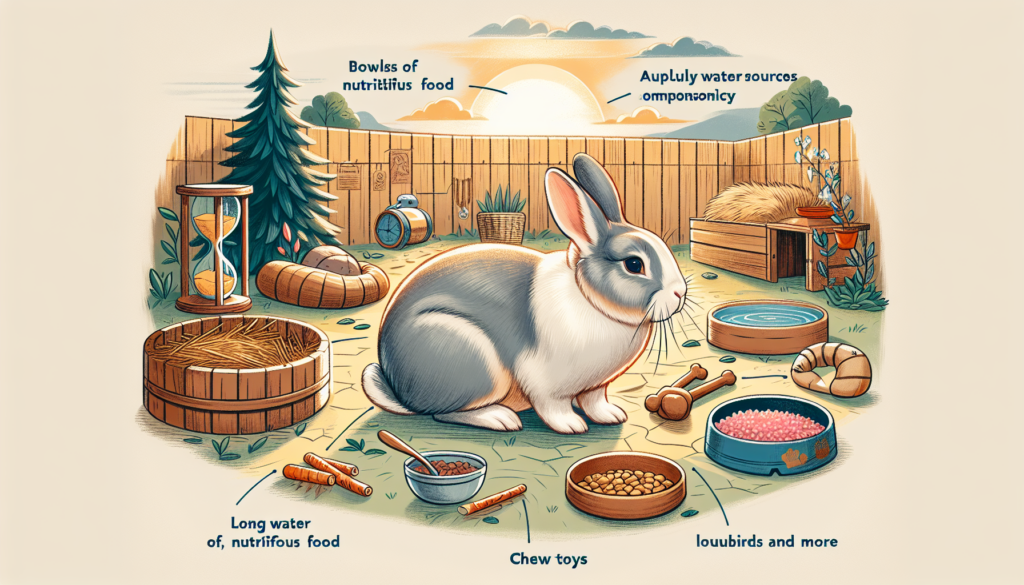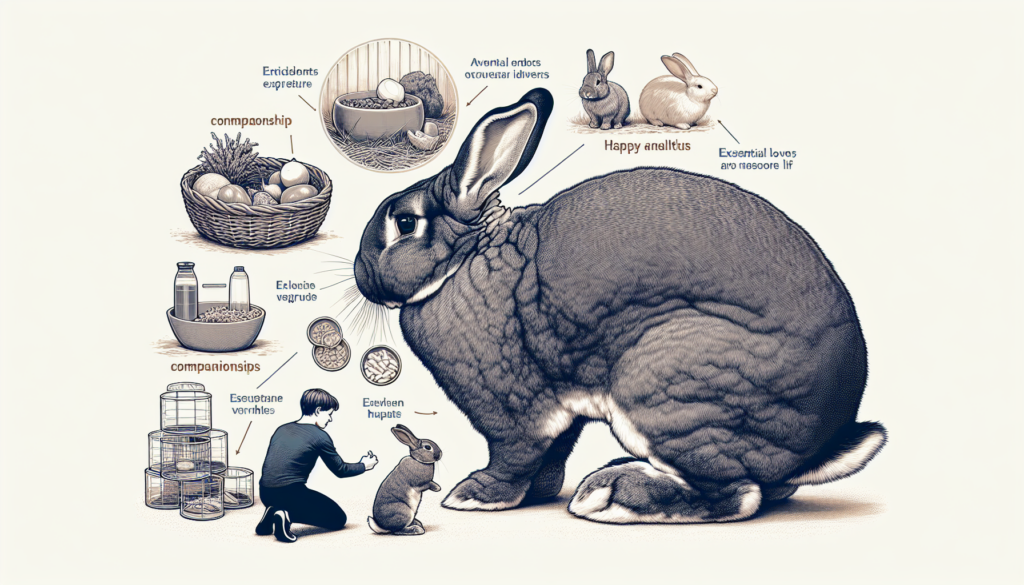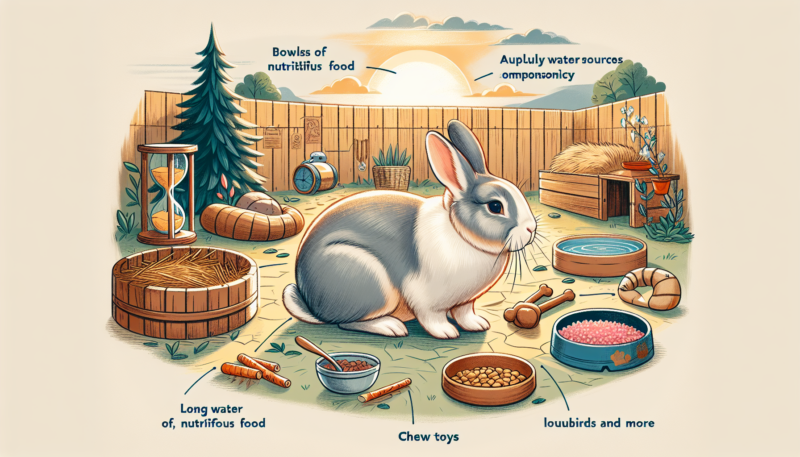Have you ever wondered about the lifespan of Flemish Giant Rabbits? These adorable creatures are known for their large size and gentle nature. In this article, we will explore the average lifespan of Flemish Giant Rabbits and provide some tips on how to ensure they live a happy and healthy life. So, if you’re a proud owner or simply curious about these magnificent rabbits, keep reading to discover the secrets of their longevity.
Factors Affecting Flemish Giant Rabbit Lifespan
Flemish Giant rabbits, known for their impressive size and gentle temperament, require proper care and attention to ensure a long and healthy life. Several factors influence the lifespan of these magnificent creatures, including genetics, nutrition, exercise, and healthcare. By understanding these factors and implementing appropriate measures, you can contribute to increasing the lifespan of your Flemish Giant rabbit and provide them with a fulfilling and happy life.

Average Lifespan of Flemish Giant Rabbits
The average lifespan of Flemish Giant rabbits typically ranges from 5 to 10 years. However, there can be variations in lifespan depending on various factors, including genetics, diet, exercise, and overall healthcare. While some rabbits may live shorter lives due to health complications, others can surpass the typical lifespan range with proper care and attention.
Variations in Lifespan
Flemish Giant rabbits’ lifespan can vary considerably from individual to individual. Factors such as genetics, environment, and overall health play a crucial role in determining how long a rabbit will live. Additionally, the quality and consistency of care provided to the rabbit throughout its life can greatly influence its overall lifespan. By ensuring a nurturing and supportive environment, you can help maximize your Flemish Giant rabbit’s potential lifespan.
Typical Lifespan Range
As previously mentioned, the typical lifespan range for Flemish Giant rabbits falls between 5 to 10 years. This range serves as a general guideline, but it is essential to note that individual rabbits may surpass or fall short of this range. By providing optimal care and attending to their specific needs, you can potentially extend your rabbit’s lifespan and enjoy their companionship for an extended period.
Oldest Recorded Flemish Giant Rabbit
The oldest recorded Flemish Giant rabbit lived an astonishing 14 years. This remarkable achievement highlights the potential for long and healthy lives in these rabbits when provided with excellent care and attention. While not all rabbits will reach this milestone, it serves as a testament to the impact of responsible breeding, proper nutrition, regular exercise, and diligent healthcare.
Genetics and Lifespan
Genetics plays a significant role in a Flemish Giant rabbit’s lifespan. The inheritance of specific genes can influence their longevity and overall health. Responsible breeding practices aim to select rabbits with robust genetic backgrounds, reducing the likelihood of hereditary health issues. By prioritizing responsible breeding and obtaining rabbits from reputable breeders, you can increase the chances of owning a rabbit with a potentially longer lifespan.
Inheritance of Longevity
The inheritance of longevity is a complex topic in genetics. While specific genes and traits may contribute to a longer lifespan, there are also external factors that can impact a rabbit’s overall health and lifespan. It is essential to choose a rabbit with a healthy genetic lineage while also ensuring proper care and environmental factors that promote longevity.
Common Genetic Health Issues
Though Flemish Giant rabbits are generally healthy, some genetic health issues may affect their lifespan. Some common health problems include musculoskeletal issues, dental problems, gastrointestinal disorders, and reproductive disorders. It is crucial to be aware of these potential genetic health issues and work closely with a veterinarian who specializes in rabbits to address any concerns and provide appropriate care.
Significance of Responsible Breeding
Responsible breeding practices are vital for maintaining the overall health and longevity of Flemish Giant rabbits. By selecting rabbits with strong genetic backgrounds and monitoring for potential hereditary health issues, breeders can contribute to the overall well-being of these magnificent creatures. By obtaining rabbits from responsible breeders, you can ensure that your rabbit has a better chance of a long and healthy life.
Nutrition and Lifespan
Proper nutrition is essential for maintaining a Flemish Giant rabbit’s overall health and extending their lifespan. A balanced diet, tailored to meet their specific nutritional requirements, helps prevent nutritional deficiencies and promotes optimal well-being.
Importance of a Balanced Diet
A balanced diet consisting of high-quality hay, fresh vegetables, and specially-formulated rabbit pellets is crucial for a Flemish Giant rabbit’s nutrition. Hay should make up a significant portion of their diet as it aids in digestion, maintains dental health, and provides essential fiber. Fresh vegetables like leafy greens, carrots, and bell peppers add variety and additional nutrients. Rabbit pellets, specifically formulated for their dietary needs, can supplement their diet with essential vitamins and minerals.
Dietary Requirements
Flemish Giant rabbits require a diet rich in fiber, protein, and essential nutrients. High-quality hay should form the majority of their diet, making up about 70-80% of their total food intake. Fresh vegetables should be provided in moderation, accounting for around 15-20% of their diet. Commercial rabbit pellets should be limited to approximately 5% of their total food consumption and carefully selected to ensure they meet the specific nutritional needs of Flemish Giant rabbits.
Common Nutritional Mistakes
One common nutritional mistake is overfeeding fruits and commercial treats. While fruits can be offered as occasional treats, they should not make up a significant portion of a Flemish Giant rabbit’s diet due to their high sugar content. Another mistake is offering an inadequate amount of hay, which is essential for proper digestion and maintaining dental health. Additionally, the improper selection of commercial rabbit pellets may lead to an imbalanced diet lacking in specific nutrients. Consulting with a veterinarian specializing in rabbits can help ensure that you are providing a nutritionally sound diet for your rabbit.
Exercise and Lifespan
Regular exercise is crucial for maintaining a Flemish Giant rabbit’s physical and mental well-being. Engaging in appropriate exercise activities helps prevent obesity, improves cardiovascular health, and enhances their overall quality of life.
Benefits of Regular Exercise
Providing opportunities for regular exercise has numerous benefits for Flemish Giant rabbits. Exercise stimulates their cardiovascular system, improves muscle tone, and contributes to weight management. Engaging in physical activities also offers mental stimulation and helps prevent behavioral issues caused by boredom. By incorporating exercise into their daily routine, you can significantly contribute to their overall health and well-being.
Suitable Exercise Options
Flemish Giant rabbits can engage in various exercise options, both indoors and outdoors. Indoor activities may include tunnel play, obstacle courses, and supervised free-roam sessions. Outdoor activities, such as supervised playtime in a securely fenced yard or on a leash, provide additional opportunities to explore and interact with their environment. It is essential to ensure a safe and secure environment for exercise, free from potential hazards and predators.
Preventing Obesity
Obesity is a common health issue among rabbits and can significantly impact their lifespan and overall health. Providing regular exercise and monitoring their food intake is essential in preventing obesity. Offering opportunities for physical activity, such as daily exercise sessions, enables Flemish Giant rabbits to burn calories and maintain a healthy weight. Consulting with a veterinarian can help determine the appropriate exercise routine and dietary adjustments needed to prevent obesity and promote a long and healthy lifespan.

Healthcare and Lifespan
Regular healthcare plays a vital role in maintaining the health and extending the lifespan of Flemish Giant rabbits. Routine veterinary check-ups, vaccinations, preventive care, and prompt treatment of any health issues are essential for their overall well-being.
Regular Veterinary Check-ups
Routine veterinary check-ups are crucial for monitoring the health of Flemish Giant rabbits and detecting any potential health issues early. These check-ups allow veterinarians to assess their overall condition, perform necessary vaccinations, and address any concerns or questions you may have. Regular visits to a veterinarian who specializes in rabbits are highly recommended for ensuring optimal care and addressing any health issues promptly.
Vaccinations and Preventive Care
Vaccinations play a crucial role in preventing certain diseases and illnesses in rabbits, contributing to their overall health and lifespan. Consult with a veterinarian who specializes in rabbits to determine the appropriate vaccination schedule and preventive care measures for your Flemish Giant rabbit. Preventive care may also include parasite prevention, dental care, and grooming to ensure their well-being.
Managing Common Health Issues
Flemish Giant rabbits may experience various common health issues throughout their lives. It is essential to be aware of these potential health problems and seek timely veterinary care. Some common issues include gastrointestinal problems, dental issues, respiratory issues, and obesity-related conditions like arthritis. By regularly monitoring their health, providing a balanced diet, and maintaining proper exercise, you can help minimize the occurrence and severity of these health issues.
Variations in Lifespan
Despite the average lifespan falling within the 5 to 10-year range, individual Flemish Giant rabbits may experience variations in lifespan due to several factors. Factors such as genetics, environment, and overall care significantly impact the longevity of these remarkable creatures.
Individual Differences
Each Flemish Giant rabbit is unique and may have different health conditions, genetic predispositions, or susceptibility to diseases. These individual differences can contribute to variations in lifespan. Proper care, including nutrition, exercise, and healthcare, can significantly influence their overall lifespan and well-being.
Environmental Factors
The environment in which a Flemish Giant rabbit lives plays a significant role in their overall lifespan. Factors such as the quality of their living conditions, stress levels, and exposure to potential hazards can impact their health and well-being. By providing a safe, enriching, and low-stress environment, you can contribute to extending their lifespan and ensuring a happy and fulfilling life.
Typical Lifespan Range
The typical lifespan range of Flemish Giant rabbits falls between 5 to 10 years. This range serves as a general guideline for their lifespan, but it is important to note that individual rabbits may experience variations due to various factors.
Average Lifespan
The average lifespan of Flemish Giant rabbits typically falls within the 5 to 10-year range. This lifespan range provides a rough estimate of how long these rabbits may live when provided with appropriate care and attention.
Factors Impacting Lifespan
Several factors impact the lifespan of Flemish Giant rabbits, including genetics, nutrition, exercise, healthcare, and overall living conditions. By addressing these factors and providing optimal care, you can potentially increase the lifespan of your rabbit and enjoy their companionship for a longer period.
Life Stages and Lifespan
A Flemish Giant rabbit’s lifespan can also be influenced by their specific life stages. Proper care and attention in each stage, from infancy to adulthood and senior years, contribute to their overall health and longevity. It is important to provide appropriate care tailored to each life stage to ensure a long and fulfilling life for your rabbit.
Oldest Recorded Flemish Giant Rabbit
The oldest recorded Flemish Giant rabbit lived an impressive 14 years, surpassing the typical lifespan range. This remarkable achievement highlights the potential for long and healthy lives in these rabbits when provided with excellent care, including proper nutrition, regular exercise, and attentive healthcare.
Notable Longevity Achievement
The achievement of reaching 14 years of age showcases the impact of responsible care and the dedication of their owner. It serves as inspiration for other rabbit owners to prioritize their Flemish Giant rabbit’s well-being and implement appropriate measures to extend their lifespan.
Factors Contributing to Longevity
The factors contributing to the longevity of the oldest recorded Flemish Giant rabbit likely include a combination of responsible breeding, a balanced diet, regular exercise, attentive healthcare, and a safe and enriching environment. By prioritizing these factors in your rabbit’s care, you can potentially contribute to their overall longevity and enjoy their companionship for many years.
Managing Common Health Issues
Flemish Giant rabbits, like any other living creatures, may encounter common health issues throughout their lives. It is important to be aware of these potential health problems and take appropriate measures to manage and address them promptly.
Gastrointestinal Problems
Gastrointestinal problems, such as gastrointestinal stasis or bloat, can occur in Flemish Giant rabbits. These conditions can be serious and potentially life-threatening if left untreated. Providing a high-fiber diet, regular exercise, and monitoring their overall digestive health can help prevent and manage gastrointestinal issues.
Dental Care
Proper dental care is essential for Flemish Giant rabbits, as dental problems can impact their overall health and lifespan. Regularly monitoring their dental health, providing appropriate chew toys, and consulting with a veterinarian for dental exams and potential treatments are crucial for maintaining their dental well-being.
Respiratory Issues
Flemish Giant rabbits can be susceptible to respiratory issues, such as upper respiratory infections or pneumonia. Proper ventilation in their living environment, regular cleaning, and immediate veterinary care at the first sign of respiratory distress are vital for managing and treating these issues.
Obesity and Arthritis
Obesity and arthritis are common health issues that Flemish Giant rabbits may experience, particularly as they age. These conditions can significantly impact their mobility, overall health, and lifespan. Monitoring their weight, providing proper exercise, adjusting their diet as needed, and consulting with a veterinarian for appropriate treatments can help manage obesity and arthritis, ensuring a comfortable and active life for your rabbit.
In conclusion, maximizing the lifespan of Flemish Giant rabbits requires careful attention to various factors, including genetics, nutrition, exercise, and healthcare. By implementing appropriate care measures and working closely with a veterinarian specializing in rabbits, you can contribute to increasing their lifespan and enjoy the companionship of these wonderful creatures for many years to come. Remember to prioritize responsible breeding, provide a balanced diet, ensure regular exercise, and seek prompt veterinary care for any health issues that may arise. With the right care and attention, your Flemish Giant rabbit can lead a long, healthy, and fulfilling life.
